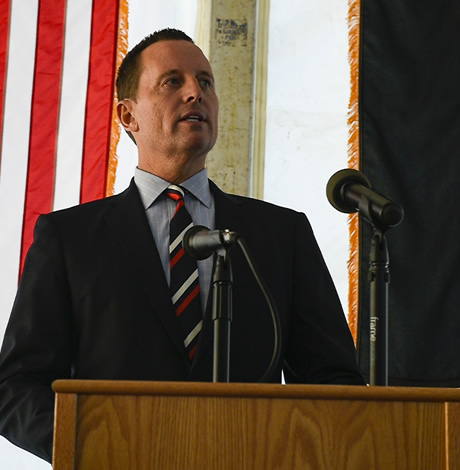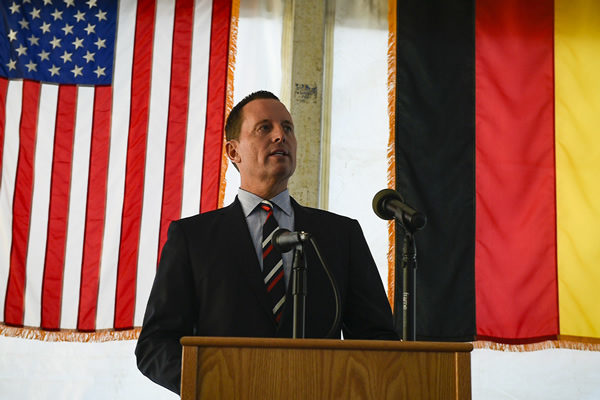News
Trump names Grenell as director of intelligence
Gay appointee would be charged with oversight of U.S. agencies


President Trump announced on Wednesday he has named Richard Grenell, who was the highest-ranking openly gay member of his administration, as acting director of intelligence.
I am pleased to announce that our highly respected Ambassador to Germany, @RichardGrenell, will become the Acting Director of National Intelligence. Rick has represented our Country exceedingly well and I look forward to working with him. I would like to thank Joe Maguire….
— Donald J. Trump (@realDonaldTrump) February 20, 2020
The move puts Grenell — now the U.S. Ambassador to Germany — in charge of overseeing U.S. intelligence agencies and advising Trump and the national security adviser on measures related to national security.
Grenell arguably will be the most senior openly gay official of any administration in U.S. history, or the first openly gay Cabinet member, although as an appointee in an acting role, his job would technically be temporary and wouldn’t require Senate approval, so his claim to that distinction is dubious.
(UPDATE: Although Trump has a predilection for naming appointees on an “acting” basis even for permanent roles, Grenell confirmed on Thursday his appointment would, in fact, be temporary.)
Sen. Mark Warner (D-Va.), vice chair of the Senate Intelligence Committee, took issue with Grenell in a statement, saying Trump’s pick lacks experience and sidesteps the confirmation process.
“The intelligence community deserves stability and an experienced individual to lead them in a time of massive national and global security challenges,” Warner said. “And at a time when the integrity and independence of the Department of Justice has been called into grave question, now more than ever our country needs a Senate-confirmed intelligence director who will provide the best intelligence and analysis, regardless of whether or not it’s expedient for the president who has appointed him.”
Angering many in Germany, Grenell has built a reputation for his combative style as a diplomat. Just this week, Grenell singled out in a series of three tweets targeted European politicians for complaining about the Trump’s administration’s approaches to NATO and the European Union.
No one is threatening you. I could say you are threatening the US that we must continue as usual even when you make dangerous mistakes. We get to have our own policy too. Don’t assume we don’t get to react to your policy. https://t.co/BAIqeQ3IPQ
— Richard Grenell (@RichardGrenell) February 17, 2020
No one is threatening you. I could say you are threatening the US that we must continue as usual even when you make dangerous mistakes. We get to have our own policy too. Don’t assume we don’t get to react to your policy. https://t.co/BAIqeQ3IPQ
— Richard Grenell (@RichardGrenell) February 17, 2020
You want a US that doesn’t pressure you to pay your NATO obligation, looks the other way when you buy too much Russian gas, doesn’t demand you take back your Nazi prison guard living in NYC, accepts your higher car tariffs and still sends 50,000 troops to your country. https://t.co/d7lze5TISc
— Richard Grenell (@RichardGrenell) February 17, 2020
The appointment of Grenell, a Trump loyalist, would be a change from former DNI director Dan Coats, who had a frosty relationship with Trump.
Coats, for example, went on the record to contradict Trump after a widely panned performance in 2018 during a joint news conference with Russian Vladimir Putin. After a meeting with Putin, Trump undermined assessments Russia interfered in the 2016 election, but later recanted. Coats stepped down from the role in the months that followed.
Highly critical of the decision to name Grenell as head of intelligence was Samantha Power, who served as U.S. Ambassador to the U.N. during the Obama administration.
One by one, day by day, @realDonaldTrump is taking steps to destroy America’s fact-based institutions, at the same time he eviscerates rule of law. Appointing as @ODNIgov @RichardGrenell, who has politicized every issue he has touched & has contempt for facts, would be a travesty
— Samantha Power (@SamanthaJPower) February 19, 2020
In his capacity as U.S. ambassador to Germany, Grenell has spearheaded an initiative to decriminalize homosexuality in the more than 70 countries around the world where it remains illegal. Earlier this year, he held an event at the United Nations on the initiative and named each of those countries, although other human rights groups in attendance were dubious about the Trump administration’s initiative.
Grenell, who had concurrently served as U.S. envoy for Serbia-Kosovo peace negotiations, is also credited with helping to negotiate with Kosovo President Hashim Thaci the first steps in the creation of a presidential commission on LGBTQ rights.
It remains to be seen what the state of the global initiative to decriminalize will be in the aftermath of Grenell’s appointment as head of U.S. intelligence.
Closely tied to Grenell is Log Cabin Republicans, which praised news Grenell would be appointed to the senior role on Twitter.
We’re excited that @realDonaldTrump has appointed the first openly gay presidential cabinet member. @RichardGrenell is totally qualified and we’re exciting that he’ll be making history. https://t.co/rcTsY7V7Y8
— LogCabinRepublicans (@LogCabinGOP) February 20, 2020
Trump reportedly has an affinity for Grenell, whose name has repeatedly come up in news reports as a possible picks for more senior roles in the administration. Grenell reportedly was on the short list for Trump’s choices as the next national security adviser and secretary of state.
UPDATE: Annise Parker, CEO of the LGBTQ Victory Institute, issued a statement Friday on Grenell’s appointment, dubbing him the highest-ranking openly LGBTQ presidential appointee in U.S. history.
“A little over sixty-five years ago, President Eisenhower signed an executive order barring LGBTQ people from serving in the federal government, resulting in the dismissal of hundreds of dedicated LGBTQ employees solely because of their sexual orientation or gender identity,” Parker said. “The ‘lavender scare’ originated in the idea that LGBTQ people were a national security risk – and that ludicrous notion persisted well into the 1990s. For an openly LGBTQ person to be appointed to the most important intelligence position in the U.S. government exemplifies how far we’ve come.”
Parker also pointed out the anti-LGBTQ policies of the Trump administration and urged Grenell to use his newfound influence to call them out.
“Acting Director Grenell has remained loyal to Trump throughout his ambassadorship, and now is the time to cash-in and use that influence to confront the administration on its anti-LGBTQ policies,” Parker said. “Representation in government is invaluable when people speak out, take on discriminatory voices and advocate for change. It takes courage – especially in an administration stocked with anti-LGBTQ activists – but we hope Grenell proves up to the challenge. If Trump believes an openly LGBTQ person can lead our national security apparatus, one would think Trump should also support that person’s right to live free of discrimination in the country he serves.”

Texas state Rep. James Talarico won a hard-fought primary Tuesday to become the state’s Democratic nominee for U.S. Senate, defeating U.S. Rep. Jasmine Crockett in one of the year’s most closely watched and competitive Democratic contests.
Talarico, a Presbyterian seminarian and three-term lawmaker from Round Rock, was declared the winner by the Associated Press early Wednesday morning after a closely tracked vote count that drew national attention.
“Tonight, the people of our state gave this country a little bit of hope,” Talarico told the AP. “And a little bit of hope is a dangerous thing.”
With 52.8% of the vote to Crockett’s 45.9%, Talarico secured the nomination outright, avoiding a runoff and capping months of sharp contrasts between the two candidates over strategy, messaging, and how best to compete statewide in Texas. Democrats hope the competitive primary — and the relatively narrow margin — signals growing momentum in a state that has not elected a Democrat to the U.S. Senate since 1988.
Talarico has long expressed support for the LGBTQ community, a position he highlights prominently on his campaign website. Under the “Issues” section, he directly addresses assumptions that might arise from his faith and background as a seminarian in a deeply conservative state.
“My faith in Jesus leads me to reject Christian Nationalism and commit myself to the project of democracy,” his website reads. “Because that’s the promise of America: a democracy where every person and every family — regardless of religion, race, gender, sexual orientation, or any other difference between us — can truly be free and live up to their full potential.”
Crockett struck a conciliatory tone following her defeat, emphasizing party unity ahead of November.
“This morning I called James and congratulated him on becoming the Senate nominee,” Crockett told Politico. “Texas is primed to turn blue and we must remain united because this is bigger than any one person. This is about the future of all 30 million Texans and getting America back on track.”
Talarico also drew national attention earlier in the race when “Late Show” host Stephen Colbert said he was initially unable to air an interview with the state legislator due to potential FCC concerns involving CBS. The episode sparked a broader political debate.
Brendan Carr, chair of the Federal Communications Commission, appointed by President Donald Trump, told reporters the controversy was a “hoax,” though he also acknowledged Talarico’s ability to harness the moment to build support as an underdog candidate. The interview was later released online and garnered millions of views, boosting Talarico’s national profile.
In November, Talarico will face the winner of the Republican primary between incumbent Sen. John Cornyn and Texas Attorney General Ken Paxton, who have been locked in a bruising GOP contest. Rep. Wesley Hunt was also in the Republican primary field. The GOP race is expected to head to a May runoff.
In a joint statement, Senate Minority Leader Chuck Schumer and Democratic Senatorial Campaign Committee Chair Kirsten Gillibrand praised Talarico’s victory and framed him as a candidate capable of broad appeal.
“As an eighth-generation Texan, former middle school teacher, and Presbyterian seminarian, James will be a fighter for Texans from all walks of life and of all political stripes,” they said. “In November, Texans will elect a champion for working people: James Talarico.”
Maryland
Md. Commission on LGBTQIA+ Affairs released updated student recommendations
LGBTQ students report higher rates of bullying, suicide

The Maryland Commission on LGBTQIA+ Affairs has released updated recommendations on how the state’s schools can support LGBTQ students.
The updated 16-page document outlines eight “actionable recommendations” for Maryland schools, supplemented with data and links to additional resources. The recommendations are:
- Developing and passing a uniform statewide and comprehensive policy aimed at protecting “transgender, nonbinary, and gender expansive students” against discrimination. The recommendation lists minimum requirements for the policy to address: name, pronoun usage, and restroom access.
- Requiring all educators to receive training about the specific needs of LGBTQ students, by trained facilitators. The training’s “core competencies” include instruction on terminology, data, and support for students.
- Implementing LGBTQ-inclusive curricula and preventing book bans. The report highlights a “comprehensive sexual education curriculum” as specifically important in the overall education curriculum. It also states the curriculum will “provide all students with life-saving information about how to protect themselves and others in sexual and romantic situations.”
- Establishing Gender Sexuality Alliances “at all schools and in all grade levels.” This recommendation includes measures on how to adequately establish effective GSAs, such as campaign advertising, and official state resources that outline how to establish and maintain a GSA.
- Providing resources to students’ family members and supporters. This recommendation proposes partnering with local education agencies to provide “culturally responsive, LGBTQIA+ affirming family engagement initiatives.”
- Collecting statewide data on LGBTQ youth. The data on Maryland’s LGBTQ youth population is sparse and non-exhaustive, and this recommendation seeks to collect information to inform policy and programming across the state for LGBTQ youth.
- Hiring a full-time team at the Maryland Department of Education that focuses on LGBTQ student achievement. These employees would have specific duties that include “advising on local and state, and federal policy” as well as developing the LGBTQ curriculum, and organizing the data and family resources.
- Promoting and ensuring awareness of the 2024 guidelines to support LGBTQ students.
The commission has 21 members, with elections every year, and open volunteer positions. It was created in 2021 and amended in 2023 to add more members.
The Governor’s Office of Communication says the commission’s goal is “to serve LGBTQIA+ Marylanders by galvanizing community voices, researching and addressing challenges, and advocating for policies to advance equity and inclusion.”
The commission is tasked with coming up with yearly recommendations. This year’s aim “to ensure that every child can learn in a safe, inclusive, and supportive environment.”
The Human Rights Campaign’s most recent report on LGBTQ youth revealed that 46.1 percent of LGBTQ youth felt unsafe in some school settings. Those numbers are higher for transgender students, with 54.9 percent of them saying they feel unsafe in school.
Maryland’s High School Youth Risk Behavior Survey reveals a disparity in mental health issues and concerns among students who identify as LGBTQ, compared to those who are heterosexual. LGBTQ students report higher rates of bullying, feelings of hopelessness, and suicidal thoughts. Nearly 36 percent of LGBTQ students report they have a suicide plan, and 26.7 percent of respondents say they have attempted to die by suicide.
The commission’s recommendations seek to combat the mental health crisis among the state’s LGBTQ students. They are also a call for local and state governments to work towards implementing them.
Virginia
Va. lawmakers consider partial restoration of Ryan White funds
State Department of Health in 2025 cut $20 million from Part B program

The Virginia General Assembly is considering the partial restoration of HIV funding that the state’s Department of Health cut last year.
The Department of Health in 2025 cut $20 million — or 67 percent of total funding — from the Ryan White Part B program.
The funding cuts started with the Trump-Vance administration passing budget cuts to federal HIV screening and protection programs. Rebate issues between the Virginia Department of Health and the company that provides HIV medications began.
Advocates say the funding cuts have disproportionately impacted lower-income people.
The Ryan White HIV/AIDS Program, a federal program started in 1990, provides medical services, public education, and essential services. Part B offers 21 services, seven of which remained funded after the budget cuts.
Equality Virginia notes “in 2025, a 67 percent reduction severely destabilized HIV services across the commonwealth.”
Virginia lawmakers have approved two bills — House Bill 30 and Senate Bill 30 — that would partially restore the funding. The Ryan White cuts remain a concern among community members.
Both chambers of the General Assembly must review their proposed changes before lawmakers can adopt the bills.
“While these amendments aren’t a full restoration of what community-based organizations lost, this marks a critical step toward stabilizing care for thousands of Virginians living with HIV,” said Equality Virginia Executive Director Narissa Rahaman. “Equality Virginia plans to continue their contact with lawmakers and delegates through the conference and up until the passing of the budget.”
“We appreciate lawmakers from both sides of the aisle who recognized the urgency of this moment and will work to ensure funding remains in the final version signed by the governor,” added Rahaman.


















